![]()
Creating a World of Peace - The Thought and Works of Sun Myung Moon by Joon Ho Seuk
|
|
Creating a World of Peace - The Thought and Works of Sun Myung Moon by Joon Ho Seuk |
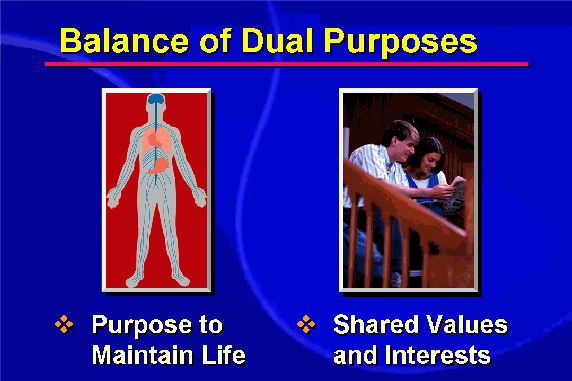
When we look at the universe, we notice that every entity has dual purposes.
Obviously, in order to exist, everything must be able to maintain itself: a flower does this by soaking in sunlight and by drawing minerals and water from the soil; people eat to gain energy, sleep to regenerate their bodies and engage in sexual relationships to reproduce themselves. This is the individual purpose.
However, the reason why entities maintain themselves is in order to fulfill some greater purpose. Thus, ultimately flowers exist to add beauty and fragrance to our world; people exist to give love and joy to one another and to God, their Creator. This is the whole purpose.
The nature of the relationship between these two purposes is very important. Part of the challenge of human life is learning to develop the proper relationship between them. In a healthy society, the individual and whole purposes naturally balance each other. The society supports the welfare of its individual members, and when these individuals prosper they are better able to contribute to the society as a whole. In order for this balance to be maintained, each person must develop a mature character, learning how to give priority to the whole purpose. Sometimes we have to sacrifice our personal desire. It means adopting a way of life in which we are concerned about others. We call this unselfishness.
From Sun Myung Moon's Philosophy of Peace, Seoul, South Korea: Sunghwa Publishing Company, 2002.
The order of existence in the universe is rooted in acting for the sake of others. The world of true peace, true love and the true ideal is both the ideal of God's creation and the desire of humankind. Therefore, the origin of happiness and peace lies in living for the sake of others.
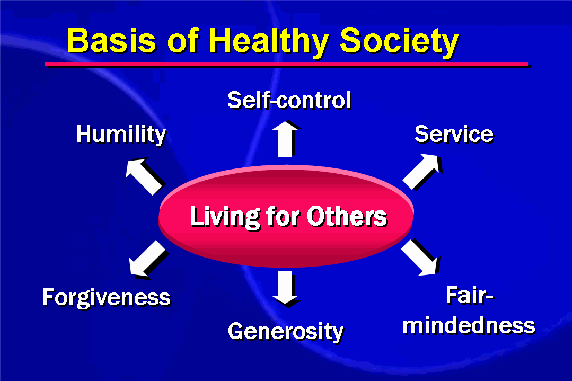
Unselfishness means living for others.
Reverend Moon calls this the ultimate purpose of life and the basis of goodness. There are certain qualities of character associated with this, such as humility, self-control, service to others, forgiveness, generosity and fair-mindedness. Historically, all cultures have honored people who demonstrated such qualities. Every culture has its heroes who exhibited some qualities of greatness, sacrifice and service for others.
The fundamental motivation for all such behavior is true love, the basis for all spiritual values. This is because we are essentially beings of heart. As heart is the basis of our personality and character, we find fulfillment through loving others and receiving love. A person of such heart naturally makes harmony in relationships with others.
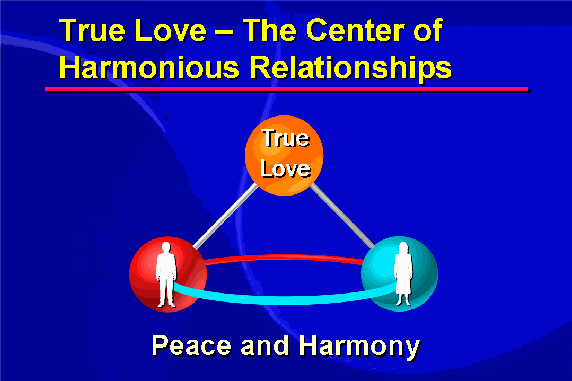
From "True Family and World Peace," New York, NY, June 11, 1998.
If true love were perfected in the human world, what problems could arise politically, culturally or environmentally? In the world of true love, there is no insurmountable problem. The world of true love is the world of freedom, peace and happiness replete with laughter and dreams -- a world in which joy and happiness are infinitely and eternally disseminated through the right of the same position, participation and inheritance that comes through true love. The complex problems that beset humankind today can be fundamentally solved only through the perfection of true love.
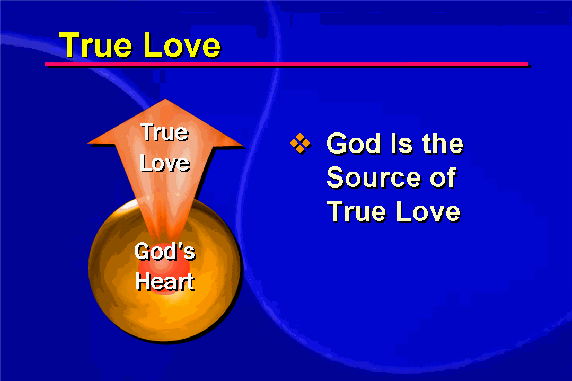
A person who practices true love would have God as his or her one and only subject.
God, as the source of true love, would dwell in the heart of such a person. There would be no conflicting desires; peace and tranquility would reign within. Neither would the mind and body be in conflict; they would be united centered on God. The mind, as the dwelling place of God, would possess the spiritual maturity to naturally subjugate the body.
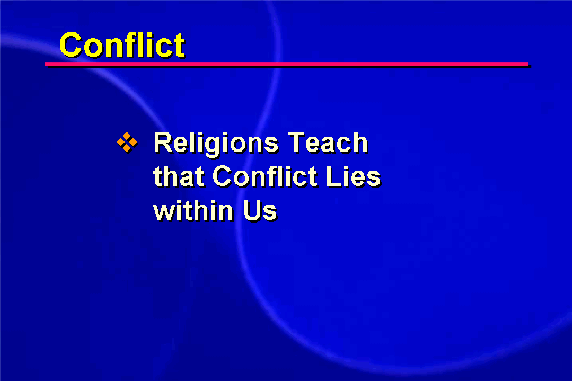
Religious teachings are concerned with basic questions about humankind: our identity, nature and destiny. They are concerned with the question of good and evil, which is certainly relevant to any discussion about the cause and resolution of conflict. Most religious teachings recognize that the source of conflict lies within ourselves, where the struggle between good and evil begins. Any attempt to resolve conflict must take as a starting point the need to look within ourselves.
From Sun Myung Moon's Philosophy of Peace, Seoul, South Korea: Sunghwa Publishing Company, 2002.
When we say there are a person of the mind and a person of the body in an individual self, as long as they fail to unite, peace cannot ever be realized. Religions are dealing with the question of how the mind and body can achieve unity.
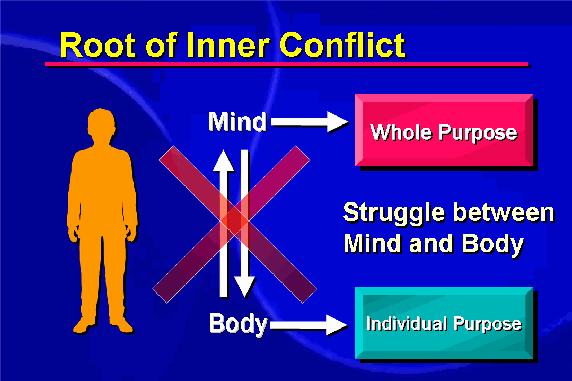
We seem to be divided against ourselves. One part of us wants to do good, is concerned about others, and is ready to give of ourselves. But at other times we find ourselves not caring about anything, and we do whatever we want to do.
Reverend Moon has identified the struggle between our mind and body as being at the root of this inner contradiction. The lofty and noble desires of our mind are often at odds with the base desires of the body. We desire and seek for world peace, alleviation of hunger, and elimination of racism, yet we are unable to control our body's desires for food, sleep and sex. Our body's instincts for self-preservation compete with our conscience, which may be telling us to sacrifice our very lives for a noble cause.
From "Let Us Protect the Peace Kingdom through the Peace United Nations," New York, NY, October 15, 2003.
This is the problem. This struggle between mind and body has become a chronic ailment more terrible than cancer or AIDS. That is why we must, no matter what the cost, push the body back into the obedient, object position.
By the law of the universe, poles with the same charge repel each other. When a pair of subject and object partners harmonize and form complete oneness, however, they receive heavenly fortune and the universe automatically protects them.
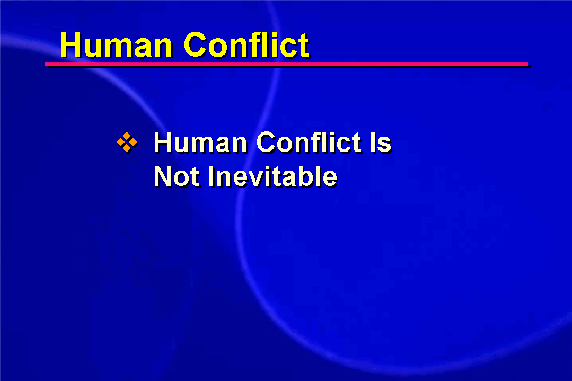
Because of the seemingly universal phenomenon of the inner contradiction, many people have concluded that such a state is natural, meaning that human conflict is inevitable. This view, however, ignores the fact that such conflict is confined to human life, while the universe in general operates according to principles and laws that produce a state of overall order and harmony.
From Sun Myung Moon's Philosophy of Peace, Seoul, South Korea: Sunghwa Publishing Company, 2002.
If we were originally born as people whose mind and body are in constant conflict, the ideal, philosophy and peace would all be nothing but impractical theories. They would all be futile. If humankind were not originally created thus, these things would be feasible, but if humankind were originally created in this state, they would be in vain. Man is a resultant being, not a causal being. Since his creation was due to something, the result must be one with the cause. Cause and effect cannot be different.
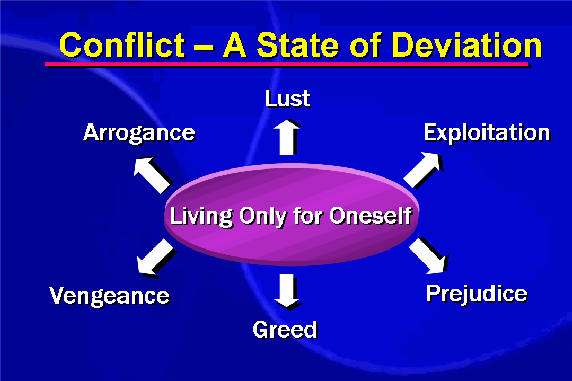
Problems arise when we put the individual purpose above the whole purpose. We call a person who does this consistently a selfish person. Selfishness is the beginning point of conflict in human relationships.
A selfish person lives primarily for him or herself at the expense of others. Rather than sacrificing for the sake of others, this kind of person is ready to sacrifice others for his or her own benefit. Most of us would agree that this fits the basic definition of evil.
From Sun Myung Moon's Philosophy of Peace, Seoul, South Korea: Sunghwa Publishing Company, 2002.
God created all things to build a garden of peace and love. God created humankind to have relationships amid joy. God did not create all things with the desire that heaven and earth become the battleground between man and Satan. This has deviated from the principles of heavenly law.
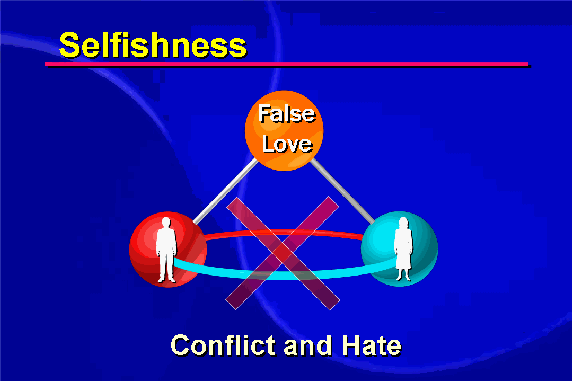
If the fundamental motivation for unselfish behavior is true love, the motivation for selfishness must find its basis in false love, which is the love of oneself over and above all else. Such a person has lost touch with the source of love, God. His heart and mind are unable to resonate with God, as if some kind of wall has been built around them, and God is unable to enter. The severing of the vertical relationship with God leads to the alienation of human beings from each other and eventually to conflict situations arising when they come into contact with each other.
From Gathering for Reading and Learning Series, Volume 2 Part 1: Way of Unification, Washington DC: FFWPU, 1998.
Originally, God's love was always to enter the mind and body of the human being, bringing about a state without any conflict, contradiction, or struggle. However, the human being was separated from God and established a self-centered relationship of false love, thereby bringing about struggle and contradiction between mind and body.
Thus, such a history came about in which love centered on the external body has betrayed God's love, the ideal, and the eternal origin of life centered upon the mind. Therefore, we have to eradicate this external love, that is, the love of Satan, and instead, in its place, inherit the original internal love, God's love, and establish unity between mind and body.
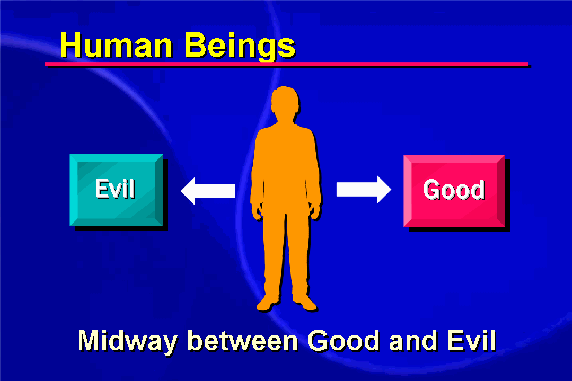
Of course, few people are downright totally evil or good, but we are a mixture of the two.
Thus, there are times when we are openhearted and altruistic, and may feel God's presence with us. But we can also easily feel cut off from God, isolated from our fellow human beings and totally consumed with ourselves. Instead of God, we may sense the presence of some sort of evil force, impelling us to act selfishly against our better judgment. Very often our evil nature seems to be easily activated, whereas we must make conscious effort to cultivate the goodness within us. Such is the state of human existence: we grope in the shadow of death even as we seek the light of life. We seem to stand in a midway position between good and evil.
From "Let Us Perfect the Peace Kingdom through the Peace United Nations," New York, NY, October 15, 2003.
More than six billion people are living in the world today, but no one has clear knowledge about the origin of humankind. Our history began through some unclear process. Whether it was good or bad, we do not know. This history has continued to the point where today the world's population exceeds six billion. Because the origin and process are unclear, the end is unclear as well. For this reason, we see continuous disorder and confusion in the world today.
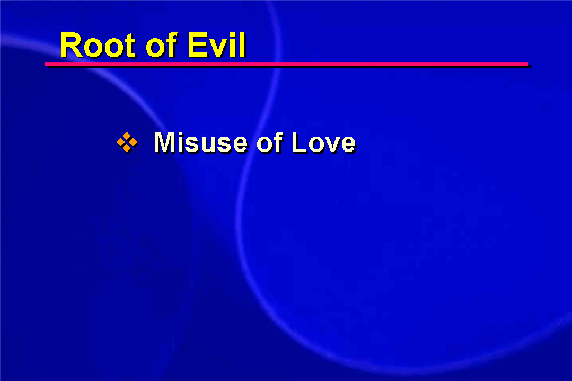
How did human beings arrive at this state of inner contradiction? We have seen that both unselfishness and selfishness are based in some way upon love, whether true or false.
Thus, love itself is the beginning point of both good and evil. Which one it is depends upon love's direction and purpose. One represents the proper use of love; the other its misuse. After many years of spiritual struggle, Reverend Moon discovered that evil began through the misuse of love, i.e., when love (or the appearance of it, for we could argue that false love is not love at all) was used to advance selfish desires at the expense of others.
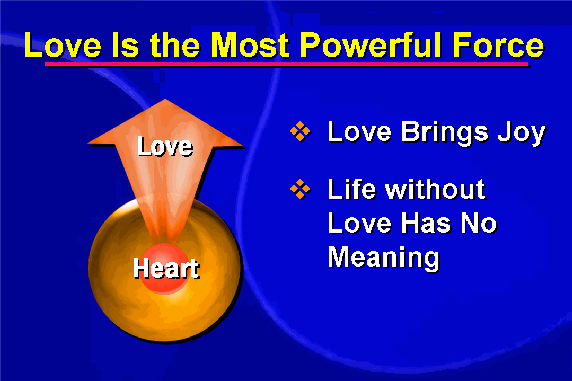
Why love? If we understand the nature of God, then we can understand that God made love to be the most powerful force in the universe, even transcending universal law.
Ultimately God is our Heavenly Parent and wants to relate to us with that kind of heart.
Our relationship with God is meant to be heart-to-heart through love. Of course, God wants us to abide by certain moral and ethical laws, but the real purpose is in order to bring our hearts in alignment with His. Obviously, we have not developed that kind of deep relationship. That is because at the very beginning of history, human beings misused love.
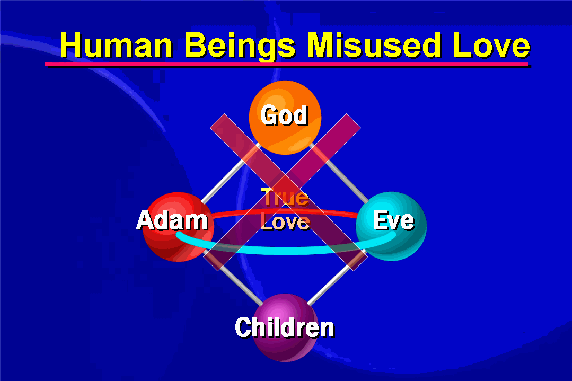
In many cultures the story of the first human ancestors includes some kind of action, such as opening Pandora's box or eating the forbidden fruit, which had serious consequences for all humankind. If we understand that the source of the human problem lies with the misuse of love, we can realize that these stories are talking about engaging in a love relationship prematurely.
Indeed Reverend Moon's unique contribution to solving this mystery is that, based on the foundation of many years of prayer and struggle, he could reveal that our first ancestors engaged in a sexual relationship before they were ready.
From "View of the Principle of the Providential History of Salvation," Inaugural Banquet of The Washington Times Foundation, Washington, DC, April 16, 1996.
The only possible sin that could have been fatal in the Garden of Eden, where Adam and Eve were in communication with God and living in joy, was the sin of illicit love. The first consummated love of the human ancestors, because it was supposed to have been the perfection of the love of God Himself, should have marked the beginning of a celebration that would continue throughout history, filled with the never-ending intoxication of joy and blessing for God, Adam and Eve, and the universe. It should have been a joyous occasion in which the love, life and lineage of God would have been established within humankind.
To the contrary, however, Adam and Eve covered their lower parts and hid themselves among the trees, trembling in fear. By disobeying heavenly law, they established an immoral relationship as the basis for false love, false life and false lineage. As descendants of Adam and Eve, all human beings are born with Original Sin. The Fall gave rise to conflict of mind and body within every person and caused our societies to be filled with tainted love, and people to do things that contradict the desire of their original minds.
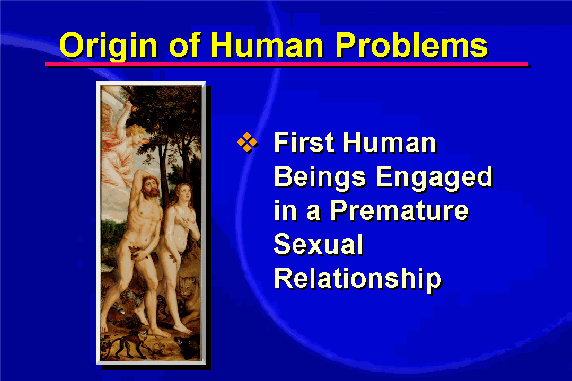
The Genesis story of the human fall in particular lends itself to this interpretation: Adam and Eve in the Garden of Eden are commanded by God not to eat the fruit of the Tree of Knowledge of Good and Evil. However, in succumbing to the temptations of a serpent, first Eve, and then Adam, eat the fruit and are banished from the Garden forever. Fruit contains the seeds for new life, and fruit eaten prematurely before fully ripened means that the seeds may produce damaged offspring. Adam and Eve's engaging in premature love damaged their ability to take care of their offspring, i.e., their hearts could not develop to their full potential.
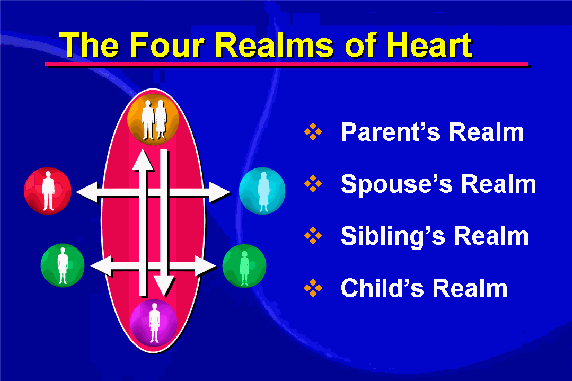
This means that they were unable to pass successfully through the four realms of heart.
Thus, even though biologically-speaking they became parents, without experiencing the realms of heart of children, siblings, and spouses as preparation for the responsibilities of parenthood, they were unable to give true parental love to their children.
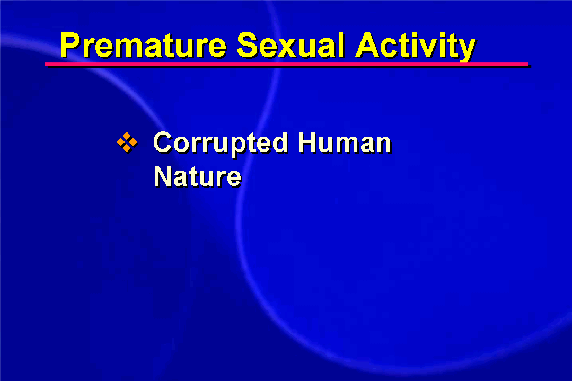
The misuse of love at the beginning of human history led to a fundamental corruption of human nature. Succumbing to sexual temptation means that the first ancestors allowed themselves to follow their body's desires against their own best interests, and so the historical struggle between the mind and body began. The mind was no longer free to pursue the whole purpose without interference from the body, stunting the growth and development of the human heart and weakening the conscience. In their corrupted state human beings no longer resembled God and became separated from Him.
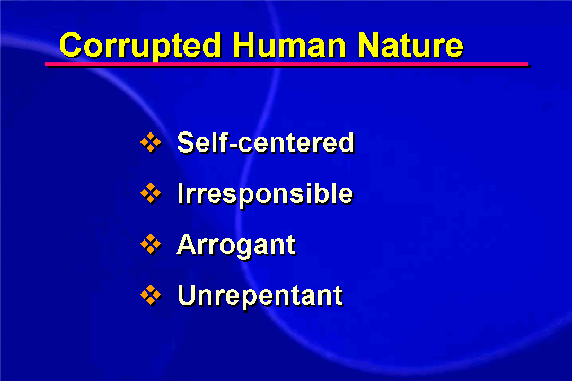
According to Reverend Moon's teaching, this corrupted nature has
four main features:
1) inability to see and love from God's
viewpoint (self-centeredness);
2) tendency to leave one's proper
position (irresponsibility);
3) tendency to reverse dominion in
one's relationship with others (arrogance); and
4) tendency to
multiply evil to others (inability to repent).
Naturally, corrupted human nature has given rise to a history of corruption, conflict and suffering in human relationships, from the individual level to the family, clan, tribe, nation and worldwide levels.
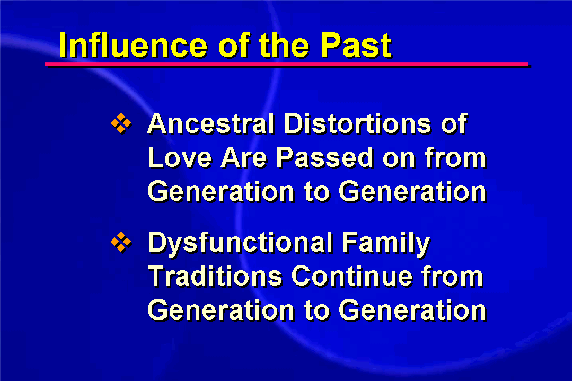
We are not just a collection of individuals but products of history, of our ancestors, and, most directly, of our own parents. Their mistakes and problems come down to us and influence who we become. Who we are is very much influenced by who our ancestors were.
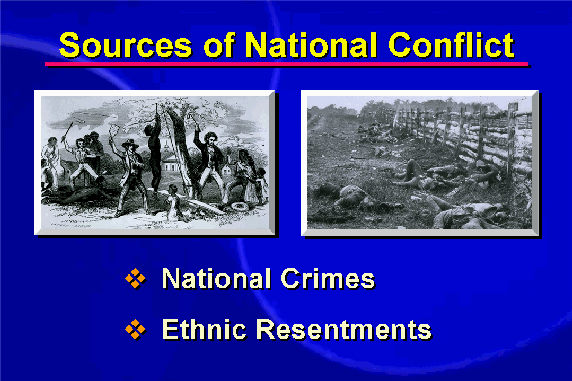
We are affected also by the cultural environment that surrounds us. We pick up certain attitudes, beliefs and habits from the society in which we live -- both good and bad.
Thus, the crimes of our culture in a sense become our crimes, whether we are directly involved in them or not. One good example is the historical problem of racism in America.
Its origins lie hundreds of years ago when Africans were brought to America as slaves.
For nearly two and a half centuries most black people in America were slaves. Although only a small minority of the white population actually owned slaves and not all white people could be characterized as racist, all white people were implicated by this great crime. Eventually the entire country was embroiled in a civil war that set brother against brother and which cost the lives of half a million (mostly white) people.
Without exaggeration it can be said that conflict is one of the most distinguishing characteristics of human history. Many cases of conflict involve antagonists who have been fighting each other for generations, even centuries. They seem to be caught in some kind of trap from which they are unable to escape. A strike from one side invites a near automatic retaliation. This is certainly what we observe quite vividly in the Middle East today.
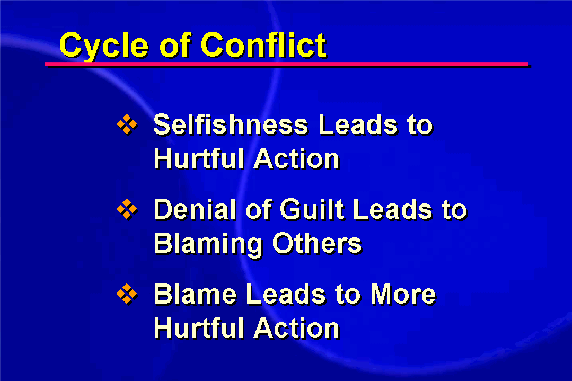
This "cycle of conflict" begins and ends with our inability to love, rooted in the selfishness born out of the corruption of human nature.
Our inability to love inevitably leads to hurtful action -- sometimes intentional, sometimes inadvertent. When we engage in hurtful action, our conscience naturally causes us to feel guilty about what we did. God, through our conscience, is constantly working to guide us in the right direction. Whenever we deviate, our conscience is there to tell us so that we will correct our behavior and get back on the right path. To work properly, the process requires that we admit our guilt to ourselves and others, before we can take corrective action. Instead, what we often do is deny our guilt and lay the blame somewhere else, usually at the feet of the very person or persons that we hurt. Then, rather than resolving the situation we end up repeating the hurtful action over and over again. The conflict is never resolved; neither do we develop our heart and character. Instead, we remain stuck at an immature level.